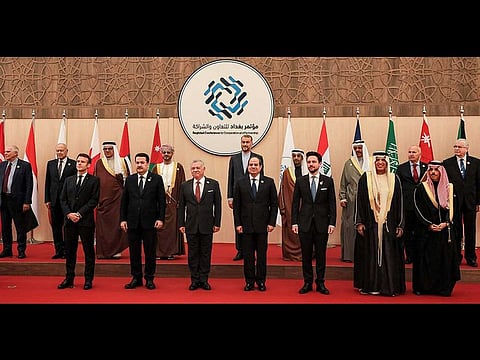Mideast, Europe leaders meet in Jordan on security in Iraq
President Macron says France attached to the stability of the region

Dead Sea: Leaders from the Middle East and Europe gathered in Jordan Tuesday in a conference focused on bolstering security and stability in Iraq.
The meeting included high-level officials from Saudi Arabia and Iran, along with leaders from the UAE, France, Iraq, Turkey, Egypt, Kuwait, Bahrain, Oman and the European Union. The countries said the goal was to show “support for Iraq, its sovereignty, security, and stability, as well as its political process, its economic and development progress, and its efforts to rebuild.”
Iraq’s stability and security have been shaken for decades by internal and external conflicts. The 2003 US-led invasion led to years of intense violence and sectarian strife.
More recently, the country has been paralysed by political gridlock, with the main dividing line running between Iran’s allies and opponents. Recently, Baghdad has attempted to assume the role of mediator between Iran and Saudi Arabia.
Tuesday’s gathering was held as a follow-up to the Baghdad Conference for Cooperation and Partnership convened in Iraq last year with France co-organising. Paris has taken an increasingly active role in the region in recent years, with President Emmanuel Macron also attempting to intervene to resolve the political crisis in Lebanon.
Speaking at Tuesday’s conference, Macron said France is attached to the stability of the region, which he said is struggling with “deadlocks, divisions, foreign meddling and security issues” in the interests of promoting peace and security in the broader Mediterranean basin.
“Iraq probably is, given the past decades, one of the main victims of regional destabilization,” Macron said. “We need to be able to....overcome the divisions of the moment.”
Jordan’s King Abdullah II said in his opening remarks that the meeting “takes place at a time when the region is facing security and political crises,” along with threats to food, water, health and energy security and the impacts of climate change.
There were no direct meetings scheduled between Iranian and Saudi officials during the conference, but the foreign minister of both countries spoke separately in the opening session.
Iranian Foreign Minister Hossein Amir-Abdollahian said Iran’s “policy is to avoid war and work to restore security and stability” and that the country is “ready to develop relations with all the countries of the region, including the friendly countries on the southern shore of the Arabian Gulf.”
He also asserted Iran’s willingness to return to an international agreement on its nuclear program “provided that red lines are not crossed.”
Saudi Foreign Minister Prince Faisal Bin Farhan said that the kingdom “affirms its total rejection of any aggression on the territory of Iraq,” an apparent swipe at Iran, which has recently launched airstrikes against Kurdish Iranian dissident groups in northern Iraq.
Ahmed Aboul Gheit, chief of the Arab League, called for Baghdad to be left out of regional rivalries, saying that “Iraq should not be an arena for conflict or settling scores.”
Sign up for the Daily Briefing
Get the latest news and updates straight to your inbox



